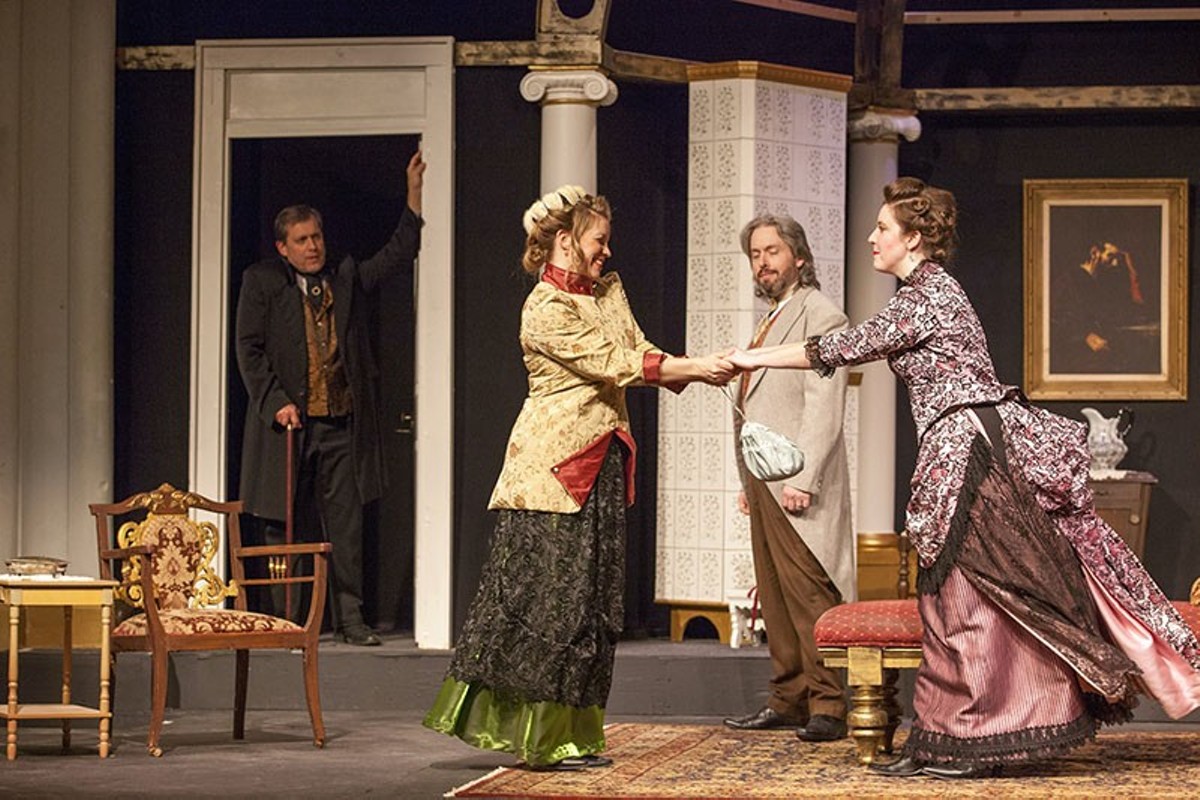Henrik Ibsen's drama A Doll's House has been decried as an abomination, hailed as a feminist critique of marriage and elevated to the unassailable position of "a classic." The problem is, once a play is understood to be a classic, it's codified as just one thing: classic. And a codified work can become stultified and unchanging.
Stray Dog Theatre's production of A Doll's House, envisioned by the company's artistic director Gary F. Bell, is thankfully a living, breathing drama about flawed people stunted by the expectations of their society. There is never a moment during the three hours of the show that doesn't feel fresh, and there is never a moment in which the trajectory of Nora and Torvald's marriage feels like a known quantity. Every secret revealed is shocking, every reaction a surprise.
Nora (Nicole Angeli) is a woman whose life is lived at the behest of Torvald (Ben Ritchie), a lawyer turned bank manager who is as stern and grave as his wife is flighty and gay. Their relationship is sharply divided along gender lines: He earns the money and makes all decisions, and she raises their three children and flits about the house singing and spending Torvald's money on beautiful things. She calls him Torvald, and he calls her Skylark or Squirrel; her actual name may as well be forgotten.
But Nora has a secret, which she reveals to her old friend Kristine (Rachel Hanks). When Torvald was deathly ill, Nora illegally arranged a loan (a woman isn't allowed to conduct business on her own behalf) that allowed the family to move from frigid Norway to sunny Italy. It saved Torvald's life, but he is unaware of her outstanding loan and her steady efforts to chip away at the balance.
Nora got the loan from Krogstad (Jason Peirick), a shady bank employee Torvald wishes to fire. Krogstad blackmails Nora, saying he'll tell Torvald about her illegal loan unless she persuades Torvald to keep him on staff. Now Nora is desperate to conceive of a way to forestall Torvald discovering what she did.
Angeli is a treat, adopting a chirping tone and flashing her big eyes as happy Nora contemplates all the things Torvald's new job will afford. When time begins running out on her big deceit, though, that joy becomes a mania that threatens to incinerate her from the inside out.
Hanks is excellent as the dour Kristine, a widow whose sorrow is caused not by the death of her husband but by the loss of her purpose. She has no one to care for now, and society fairly shouts at her that she's useless if she's not mothering children or a man. Quiet, reserved and self-possessed, Hanks conveys with her uplifted chin Kristine's solid sense of self-worth, which she earned by making her own way in the male world.
And then there's Torvald. Poor, dumb Torvald. Ritchie plays him as a man at best 50 percent present in his own life. He never interacts with his sons, and his wife is but a beautiful distraction to enjoy in short bursts, but his commitment to work — the male world — is such that after midnight on Christmas day he goes to check the postbox to see if any more paperwork has been dropped off. "When a real crisis comes, I will have strength and courage for the both of us," Torvald condescendingly reassures his wife.
When that crisis arrives, only to be resolved with no effort on his part, Ritchie gives a relieved shout of "I'm saved!" Angeli's frigid response, "And me?" is the sledgehammer that finally puts a crack in his happy world. Everything that comes after is the nub of Ibsen's classic, and in this production it thrills with the vitality of Angeli and Ritchie's performances.
Inside Bell's doll house, there are no innocent people. Nora enslaved herself as surely as Torvald did himself, and Krogstad and Kristine as well. But the only condemned inmates are the ones who don't make an effort to break free.






